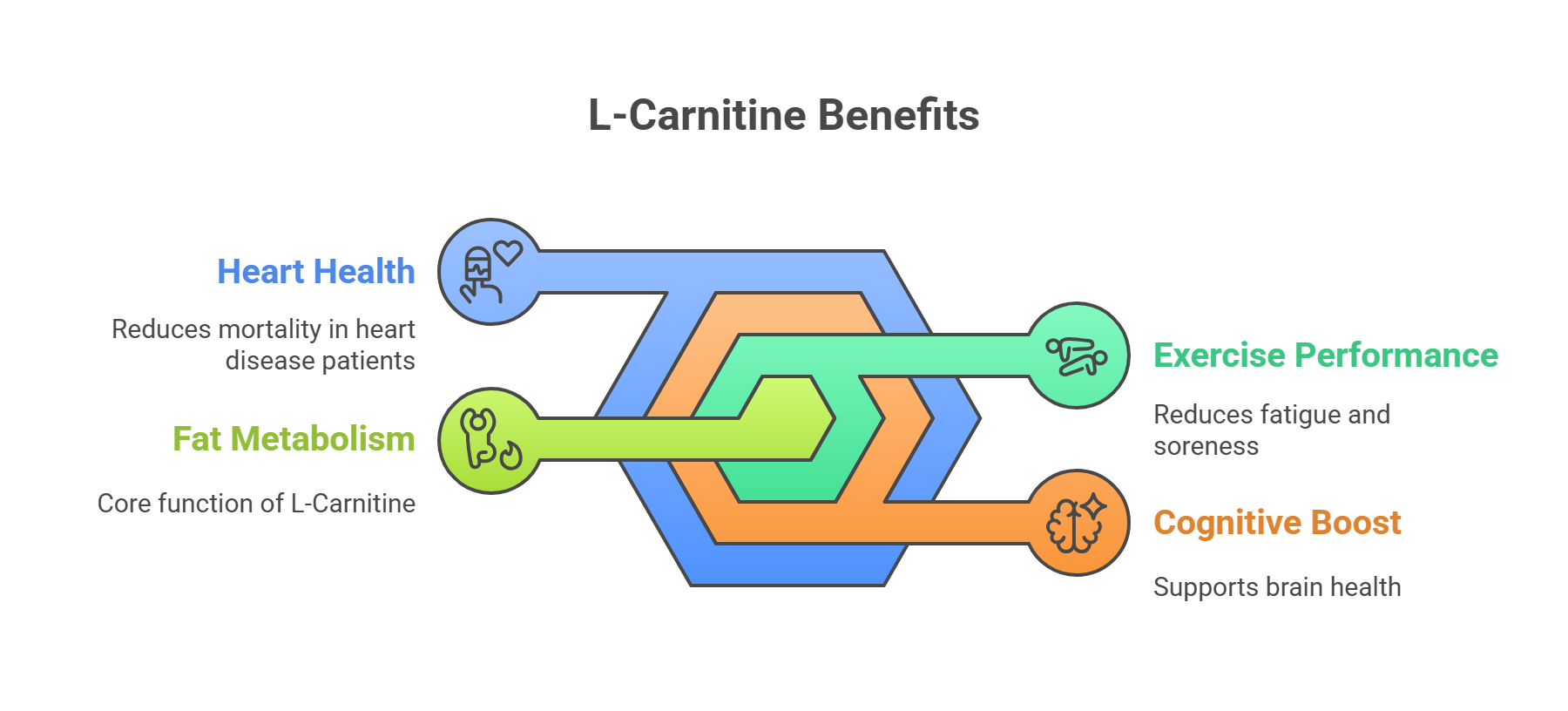
L-Carnitine for Weight Loss: Fat’s Worst Frenemy or Just Hype?
Trying to lose weight but feel like your metabolism is stuck in 2009? Enter L-Carnitine — the supplement that’s often hyped as the VIP pass to fat-burning glory. But is it legit, or just another powdered placebo? Let’s unpack what L-Carnitine actually is, how it works, and whether it’s worth adding to your weight-loss toolkit (along with a little laughter and a lot of facts).
🔬 What is L-Carnitine, Really?
L-Carnitine is an amino acid-like compound that your body naturally produces — primarily in the liver and kidneys — using lysine and methionine. Its main job? Shuttling fatty acids into your cells’ mitochondria (aka your internal power plants), where the fat gets turned into energy.
Think of L-Carnitine as an Uber driver for fat — if fat doesn’t get a ride into the mitochondria, it just hangs out in your body like an uninvited guest at a dinner party.
🏋️ L-Carnitine Benefits (Spoiler: It’s Not Just for Bodybuilders)
Here’s why people are buzzing about L-Carnitine:
Fat Metabolism: By transporting fat into the mitochondria, it helps your body burn it more efficiently — especially during exercise.
Improved Exercise Performance: Some studies suggest it reduces fatigue and muscle soreness after workouts.
Cognitive Boost: Emerging research hints at L-Carnitine potentially supporting brain health.
Heart Health: According to a 2013 meta-analysis published in Mayo Clinic Proceedings, L-Carnitine was shown to significantly reduce all-cause mortality in patients with heart disease.
🧠 Dr. Stephen Sinatra, a well-known cardiologist and author of "The Sinatra Solution," refers to L-Carnitine as one of his “go-to” nutrients for supporting cardiovascular health and metabolic function.

🧪 So...Does L-Carnitine Help You Lose Weight?
Short answer: Yes — but only if you’re putting in the effort too.
In a systematic review published in Obesity Reviews (2020), researchers analyzed 37 studies and concluded that L-Carnitine supplementation had a “modest yet statistically significant effect on weight loss and BMI reduction,” particularly in overweight or obese individuals.
That said, L-Carnitine is not a magic pill. It works best when combined with a calorie deficit, regular exercise, and not living exclusively on Uber Eats.
⚠️ L-Carnitine Side Effects (Because No One Likes Surprises)
For most people, L-Carnitine is safe when taken as directed (500–2,000 mg/day). But like your in-laws, it doesn’t always play nice:
Fishy Body Odor: Seriously. It’s rare, but it happens.
Nausea or Upset Stomach
Insomnia (especially if taken late in the day)
According to Dr. Melinda Ratini, DO, of WebMD, while L-Carnitine is generally safe, “people with thyroid disorders or those taking blood thinners should consult a physician first.”
👎 The Bottom Line: Miracle or Marketing?
L-Carnitine is not a get-thin-quick scheme, but when paired with exercise and a balanced diet, it may give your fat metabolism a nudge in the right direction. It shines brightest for people already making smart lifestyle choices — not for couch-potato alchemy.
TL;DR:
L-Carnitine helps transport fat into cells to be burned as energy, making it potentially useful for weight loss. Studies show a modest benefit, especially when paired with diet and exercise. It’s not a miracle cure, but it’s not snake oil either — just don’t expect it to work while binge-watching Netflix on the couch.
Insight: Always consult your doctor before jumping on the supplement train — especially if you’re already taking medications or have existing health conditions. Better safe than sorry.
Want more no-nonsense, evidence-based wellness tips? Hit that follow or bookmark button — because health should be helpful and a little fun. 🧠💪 Take a look at all of the categories NCWellnessHub covers here.
Disclaimer: The information provided on this website is for general informational purposes only and should not be considered medical advice, diagnosis, or treatment. Always consult a qualified healthcare professional before making any decisions or taking actions related to your health, including but not limited to medical conditions, treatments, diets, supplements, or exercise programs. The content on this site is not intended to replace professional medical guidance. The website and its authors are not responsible for any actions taken based on the information provided. Ask your doctor or licensed medical professional.
 Add Row
Add Row  Add
Add 




 Add Row
Add Row  Add
Add 

Write A Comment